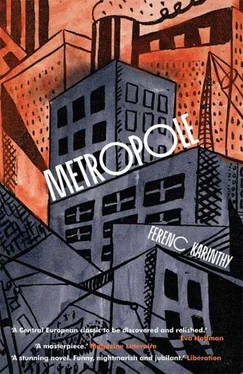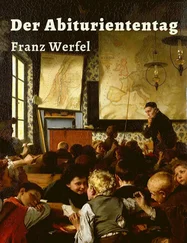‘ Chetchenche glubglubb? Guluglulubb? ’
That’s what he said or something like it then took out a small notebook bound in black, leafed through it in no great hurry and started to explain something while pointing here and there. He spoke slowly and at length then made another gesture, indicating something behind him, pedantically repeating this or that phrase so as to avoid any misunderstanding, though Budai hadn’t the faintest clue as to even what the subject was. Finally the policeman jabbed him again as if to ask whether it was all clear:
‘ Turubu, shettyekehtyovovo…? ’
There was nothing Budai could do except open his arms wide in exhaustion and shrug, at which point the policeman saluted and went off. That was enough experimentation for Budai. He was anxious to know whether the notes he had handed to the desk-clerk had found their way to an appropriate person for, if so, they might already have begun to sort things out and were perhaps looking for him, unable to find him. With this in mind he hurried back. For once it was the same clerk at the desk as before, in other words the man to whom he had handed his sheets of notepaper, in fact he recognised him at a distance from where he stood in the queue. But the sickly-looking, sour-faced clerk glanced at him as if he were a stranger and when Budai took the slip of paper with his room number from his pocket and handed it to him, the man put the key down, his face as expressionless as if he had never seen him before. Budai strained to see if there was anything else in box 921 besides the hook for the key but it was empty as the desk-clerk confirmed by spreading his palms. This was so surprising to Budai that he tried once again to explain through words and gestures that he was expecting an answer, some news or information, that there had to be some kind of message, but the man shook his head, carried on gabbling and had already turned his attention to the next guest. It was of course possible that someone was waiting upstairs in his room or at his door, that they might have left some instructions as to where he should go and whom he should see, and that everything would be sorted out. He was about to make his way over to the lift when he noticed a fat volume lying on the counter, clearly a copy of the telephone directory. The clerk happened to be looking the other way. Budai himself was surprised later at his nerve stealing it in front of all those people. He must have decided — his very nervous system must have decided — that whatever the risk he had to have a list of names, that was why he had come down in the first place. It was as if his hands had a will of their own. He stuck the book under his arm as though it belonged to him and calmly walked away with it.
But there was nothing waiting at his door, no notice on the handle, no sheet of paper lying on the threshold, nor in the crack, nor indeed anywhere, though he twice checked the number of the room just to make sure he was in the right place. Nor was there anyone inside, no note, not a scribbled message on the table or anywhere else, however hard he looked. He didn’t know how to account for it: maybe his request had not yet been dealt with, maybe they had not done anything yet. Was it possible that, if it came to it, he had to spend another night here? If that were so he would only get to the conference in Helsinki on the second day, and even then only to the afternoon session at the earliest! The thought made him so cross the blood rushed to his head: he was forced to dismiss the thought. The constant running about, on top of everything else, had exhausted him: his shirt was soaked in sweat and he desperately wanted a shower. But in order to do this he had, shamefully, to unpack again, to take the toiletries out of his hand luggage, as well as the washing powder he carried on such trips to give his underwear a quick rinse.
Having refreshed himself a little he sat down comfortably at the writing table in his pyjamas and slippers and set to study the stolen directory. It had hard brown covers with several lighter coloured letters of various sizes embossed on it in three lines of unequal length in the usual unfamiliar script. The title page displayed twenty to twenty-five densely set words and groups of words with numbers beside them, undoubtedly the numbers of various public utilities. Straight after this followed some seven pages of unbroken text with hardly any spaces between the words, presumably the regulations regarding use of the telephone and postal service, then some diagrams, most likely showing the tariff for various kinds of call. The list of names ran to somewhere between eight hundred and a thousand large-format pages, each with five columns, in letters so small Budai had to strain his eyes to read them. As far as he could tell without any clue as to what the words meant, by means of the typography alone, the list was not alphabetical but sorted under different sub-headings, possibly of a commercial kind, an endless set of numbers, headings, text and numbers. But the curious thing was that the numbers — not only the ones at the front but those in the body of the book — were not of equal length: two, three or four figures, five, six, seven, even eight-figure numbers appeared one after the other, jumbled up, without any apparent system. He tried dialling a few of the numbers set in bold type, those presumably of public utilities, but with little success: there was no connection, the line did not respond or was engaged, the buzzing broken, and even when there was distinctly the sound of ringing, few of them picked up the phone, or, if they did, gabbled in the usual incomprehensible way however many languages he tried.
There was no point in going on like this, he realised, so he turned his attention to the text. Although the history of writing was never his area of specialisation he did remember from his earlier studies how Champollion succeeded in deciphering Egyptian hieroglyphics, Grotefend the runes on Ancient Persian stones, and how someone recently managed to decrypt the inscriptions of the Maya and the wooden boards of the Easter Islanders. In all these cases the scholars were dealing with items in two or three languages or scripts like the Rosetta Stone or the trove at Persepolis, sometimes with the advantage of earlier, possibly somewhat puzzling, superscriptions that might, however, be deciphered, given enough patience, hard work and a bit of luck. The procedure was much the same in most cases: it was to assume that certain signs or group of signs approximated to certain words, names, or known combinations of sounds, then to look for clusters of such and substitute the assumed meanings until the meanings of others could be inferred to the point that the whole was rendered readable. And yet, even with the aid of the most up-to-date equipment, how many had failed and how often! Furthermore, those who did succeed might have shed decades of bitter tears in the effort. And nowadays of course there were fabulously powerful computers to facilitate the analysis of mountains of data.
What was he to do then, stuck without any help, all by himself, faced with the unfamiliar script of an unfamiliar language? What assumptions could he make, what range of data should he match up with another when he had nothing to go on, at least nothing so far, and was able to associate neither this or that group of characters with a particular word nor any particular word with any meaning? What set of characters could he try replacing with what? Despite all this he set about writing down all the different characters he could find in the telephone directory, the last page of which happened to be blank. Here he copied them one after the other, as many different ones as he could find in the text. This quiet activity, the rhythm of which resembled that of his normal scholarly process at research stage, had the effect of slowly calming him, restoring his temper, and, for a while, entirely reconciling him to his situation, so that once he had focused his attention on a restricted range of data and the nature of his problem was better defined, he had almost forgotten where he was and how he had got here. He had had such a full meal at the buffet that he never touched the remnant of food on the windowsill though he did uncork his second bottle of wine.
Читать дальше












